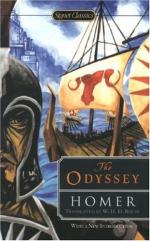Then Menelaus said, “All that you have been saying, my dear wife, is true. I have travelled much, and have had much to do with heroes, but I have never seen such another man as Ulysses. What endurance too, and what courage he displayed within the wooden horse, wherein all the bravest of the Argives were lying in wait to bring death and destruction upon the Trojans. {43} At that moment you came up to us; some god who wished well to the Trojans must have set you on to it and you had Deiphobus with you. Three times did you go all round our hiding place and pat it; you called our chiefs each by his own name, and mimicked all our wives—Diomed, Ulysses, and I from our seats inside heard what a noise you made. Diomed and I could not make up our minds whether to spring out then and there, or to answer you from inside, but Ulysses held us all in check, so we sat quite still, all except Anticlus, who was beginning to answer you, when Ulysses clapped his two brawny hands over his mouth, and kept them there. It was this that saved us all, for he muzzled Anticlus till Minerva took you away again.”
“How sad,” exclaimed Telemachus, “that all this was of no avail to save him, nor yet his own iron courage. But now, sir, be pleased to send us all to bed, that we may lie down and enjoy the blessed boon of sleep.”
On this Helen told the maid servants to set beds in the room that was in the gatehouse, and to make them with good red rugs, and spread coverlets on the top of them with woollen cloaks for the guests to wear. So the maids went out, carrying a torch, and made the beds, to which a man-servant presently conducted the strangers. Thus, then, did Telemachus and Pisistratus sleep there in the forecourt, while the son of Atreus lay in an inner room with lovely Helen by his side.
When the child of morning, rosy-fingered Dawn appeared, Menelaus rose and dressed himself. He bound his sandals on to his comely feet, girded his sword about his shoulders, and left his room looking like an immortal god. Then, taking a seat near Telemachus he said:
“And what, Telemachus, has led you to take this long sea voyage to Lacedaemon? Are you on public, or private business? Tell me all about it.”
“I have come, sir,” replied Telemachus, “to see if you can tell me anything about my father. I am being eaten out of house and home; my fair estate is being wasted, and my house is full of miscreants who keep killing great numbers of my sheep and oxen, on the pretence of paying their addresses to my mother. Therefore, I am suppliant at your knees if haply you may tell me about my father’s melancholy end, whether you saw it with your own eyes, or heard it from some other traveller; for he was a man born to trouble. Do not soften things out of any pity for myself, but tell me in all plainness exactly what you saw. If my brave father Ulysses ever did you loyal service either by word or deed, when you Achaeans were harassed by the Trojans, bear it in mind now as in my favour and tell me truly all.”




